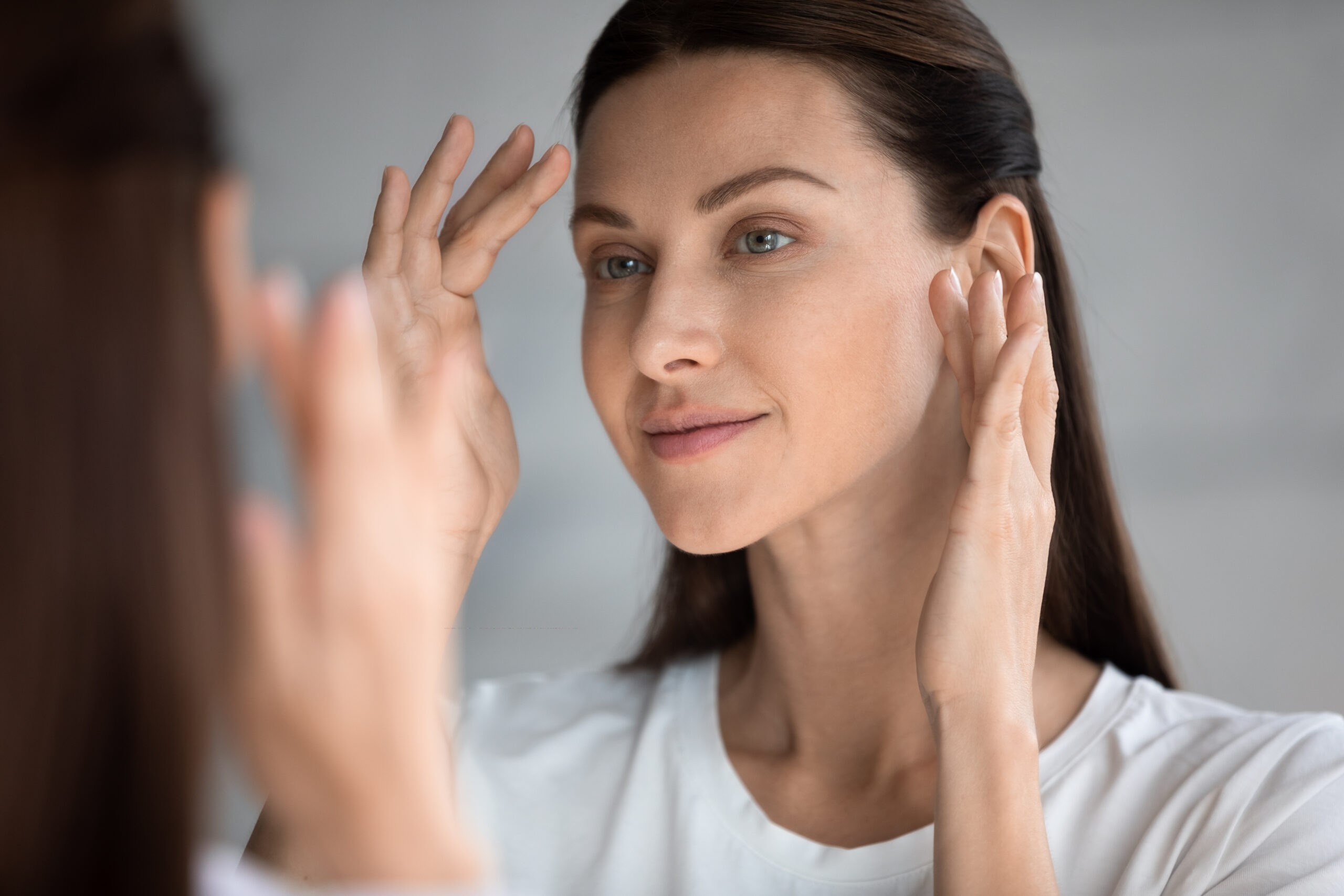
Beauty from Within: 5 Supplements to Support Skin
Feeling good about the way you look starts with how you feel on the inside. It takes a holistic
approach to address your skin’s appearance.
If you aren’t feeling or looking your best, or simply want to start taking better care of your skin,
a few simple changes to your lifestyle may be all that’s needed. Making sure that your diet is
full of phytonutrient-rich foods is a great way to start. But another way to support these
changes is by adding supplements.
These five supplements can help you feel beautiful on the inside and out.
1. Collagen.
Collagen is the most abundant type of protein in your body. It’s found everywhere, from the skin to
bones and joints. There are at least sixteen types of collagen in the body, but the kind found in your skin
helps keep the skin feeling plump and firm. 1 As you age, collagen production naturally decreases, leading to skin texture, appearance, and elasticity changes.
Collagen supplementation may help your skin by supporting improvements in wrinkles and elasticity. 2
One study found that people who took a combination supplement of type II collagen (along with
chondroitin and hyaluronic acid) saw improvements in face and eye wrinkles, skin elasticity, and skin
collagen content. They also noted decreased skin dryness and redness. 3 Similar improvements in
elasticity and appearance of eye wrinkles have been replicated in several other studies on collagen. 4 5
2. Essential fatty acids (EFA).
Essential fatty acids are fats that your body can’t make, so you have to obtain them from your
diet. Omega-3 is an essential fatty acid (EFA).
Several studies have examined the effect of fats in the diet, including flaxseed, and fish oil, and found
several skin improvements, including skin texture.
3. Vitamin C.
This nutrient is vital for vibrant skin. Vitamin C works synergistically with other nutrients. For example,
one study found that people who took a supplemental drink containing vitamin C and a fish oil
supplement saw improvements in the depth of facial wrinkles and an increase of new collagen fibres in
the skin. Vitamin C is an important factor in the prevention of skin looking more mature. 6
Another study that examined the impact of dietary nutrients on skin found that women who ate more
vitamin C-rich foods were less likely to have significant wrinkles or skin dryness. 7
4. Hyaluronic acid
You’ll often see it in topical beauty products, but HA taken orally can also help with the appearance of
your skin.
You’ll find hyaluronic acid naturally present in some foods, but supplemental HA can provide a more
concentrated dose. It’s often used in combination with other supplements, so more research is needed
on its individual effects.
One study found that oral HA combined with several other nutrients, including collagen, improved the
texture of the skin. 8
5. Green tea extract.
If you love a warm drink in the morning, you may want to make sure you are sipping green tea. Green
tea may help with smoother skin texture.
Green tea contains phytochemicals. Supplementation with green tea extract has produced beneficial
results for skin, including increases in collagen, elasticity, and improved texture when taken orally while
reducing the appearance of wrinkles when applied topically. 9 10
Targeting healthy skin from within
When it comes to vibrant skin, you can’t skip healthy habits, but these supplements can provide
additional support. Targeted nutrition through food and supplements can help you feel good about the
way you look.
While you can’t stop the natural progression of aging over time, you can take steps to control the
influence of environmental exposures. If you aren’t sure where to start, working with your healthcare
practitioner can help you tailor a plan that works best for your skin type and needs.
1. Lodish, Harvey, Arnold Berk, S. Lawrence Zipursky, Paul Matsudaira, David Baltimore, and James Darnell. “Collagen: The Fibrous
Proteins of the Matrix.” Molecular Cell Biology. 4th Edition, 2000. https://www.ncbi.nlm.nih.gov/books/NBK21582/.
2. Choi, Franchesca D., Calvin T. Sung, Margit L. W. Juhasz, and Natasha Atanaskova Mesinkovsk. “Oral Collagen Supplementation: A
Systematic Review of Dermatological Applications.” Journal of Drugs in Dermatology: JDD 18, no. 1 (January 1, 2019): 9–16.
3. Schwartz, Stephen R., Kimberly A. Hammon, Anna Gafner, Amanda Dahl, Norman Guttman, Michelle Fong, and Alexander G.
Schauss. “Novel Hydrolyzed Chicken Sternal Cartilage Extract Improves Facial Epidermis and Connective Tissue in Healthy Adult
Females: A Randomized, Double-Blind, Placebo-Controlled Trial.” Alternative Therapies in Health and Medicine 25, no. 5
(September 2019): 12–29.
4. Proksch, E., D. Segger, J. Degwert, M. Schunck, V. Zague, and S. Oesser. “Oral Supplementation of Specific Collagen Peptides Has
Beneficial Effects on Human Skin Physiology: A Double-Blind, Placebo-Controlled Study.” Skin Pharmacology and Physiology 27,
no. 1 (2014): 47–55. https://doi.org/10.1159/000351376.
5. Proksch, E., M. Schunck, V. Zague, D. Segger, J. Degwert, and S. Oesser. “Oral Intake of Specific Bioactive Collagen Peptides Reduces
Skin Wrinkles and Increases Dermal Matrix Synthesis.” Skin Pharmacology and Physiology 27, no. 3 (2014): 113–19.
https://doi.org/10.1159/000355523.
6. Jenkins, G., L. J. Wainwright, R. Holland, K. E. Barrett, and J. Casey. “Wrinkle Reduction in Post-Menopausal Women Consuming a
Novel Oral Supplement: A Double-Blind Placebo-Controlled Randomized Study.” International Journal of Cosmetic Science 36,
no. 1 (February 2014): 22–31. https://doi.org/10.1111/ics.12087.
7. Cosgrove, Maeve C, Oscar H Franco, Stewart P Granger, Peter G Murray, and Andrew E Mayes. “Dietary Nutrient Intakes and Skin-
Aging Appearance among Middle-Aged American Women.” The American Journal of Clinical Nutrition 86, no. 4 (October 1,
2007): 1225–31. https://doi.org/10.1093/ajcn/86.4.1225.
8. Kawada, Chinatsu, Takushi Yoshida, Hideto Yoshida, Ryosuke Matsuoka, Wakako Sakamoto, Wataru Odanaka, Toshihide Sato, et al.
Nutrition Journal 13, no. 1 (July 11, 2014): 70. https://doi.org/10.1186/1475-2891-13-70.
9. Prasanth, Mani Iyer, Bhagavathi Sundaram Sivamaruthi, Chaiyavat Chaiyasut, and Tewin Tencomnao. Nutrients 11, no. 2 (February
23, 2019). https://doi.org/10.3390/nu11020474.
10. Heinrich, Ulrike, Carolyn E. Moore, Silke De Spirt, Hagen Tronnier, and Wilhelm Stahl. The Journal of Nutrition 141, no. 6 (June
2011): 1202–8. https://doi.org/10.3945/jn.110.136465.


 Facebook
Facebook Instagram
Instagram